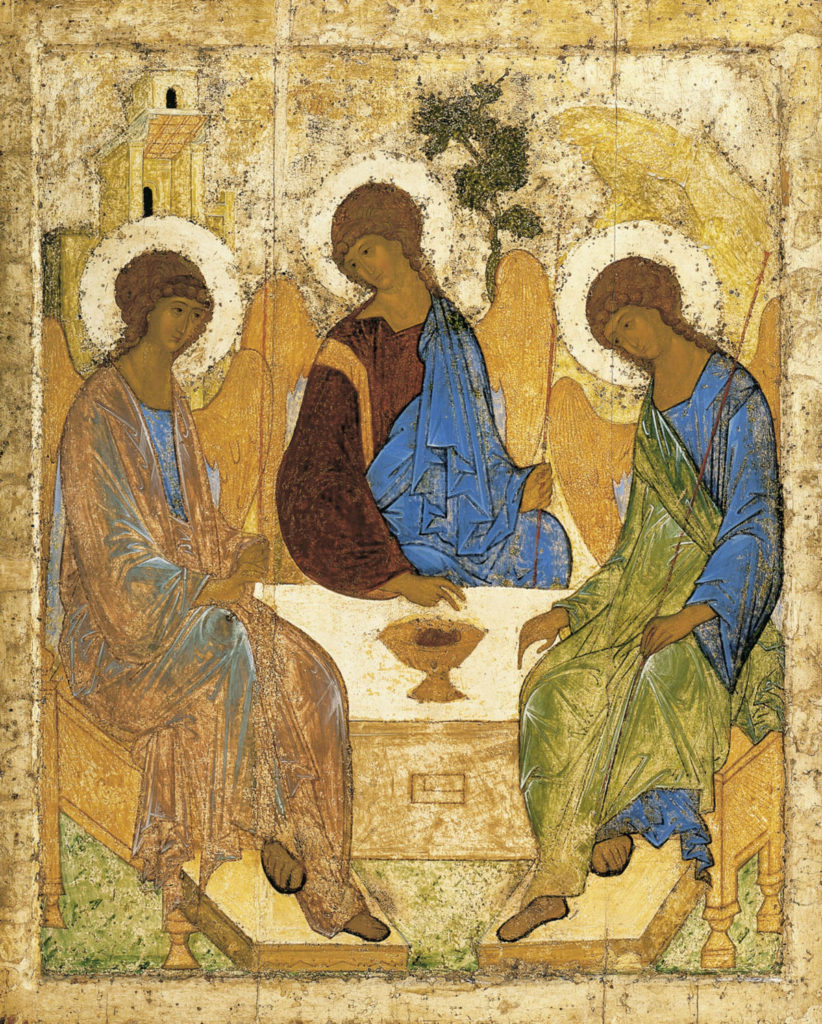Holy Trinity, St. Andrei Rublev
Mount Calvary Church
Eutaw Street and Madison Avenue
Baltimore, Maryland
A Roman Catholic Parish
The Ordinariate of the Chair of St. Peter
Rev. Albert Scharbach, Pastor
Dr. Allen Buskirk, Choirmaster
Trinity Sunday
June 16, 2019
8:00 Said Mass
10:00 Sung Mass
_________________________________________
Anthems
Tomás Luis de Victoria (1540-1611)
O lux beata Trinitas, Et principalis unitas, Iam sol recedat igneus, Infunde lumen cordibus. 2 Te mane laudum carmine, Te deprecemur vespere: Te nostra supplex Gloria Per cuncta laudet sæcula. 3 Deo Patri sit gloria, Ejusque soli Filio, Cum Spiritu Paraclito, Et nunc et in perpetuum.
O Trinity of blessed light, And princely unity, The fiery sun already sets, Shed thy light within our hearts. 2 To thee in the morning with songs of praise, And in the evening we pray, Thy glory suppliant we adore, Throughout all ages for ever. 3 Glory be to God the Father, To his only Son, With the Holy Spirit Now and for ever. Amen.
St. Thomas The Apostle Motet Choir in Hyde Park, Chicago, IL Luciano Laurentiu, conductor & music director
Sung as prelude on the vigil of The Solemnity of The Most Holy Trinity
__________
Giovanni Pierluigi da Palestrina (1525 – 1594)
Benedicta sit sancta Trinitas atque indivisa Unitas confitebimur ei quia fecit nobiscum misericordiam suam.
Blessed be the holy Trinity, and undivided Unity: we will give glory to Him, because He hath shown His mercy to us.
At St. Michael and All Angels Church
_________________
Hymns
Come, thou almighty King (MOSCOW) by the prolific composer Anonymous dates from before 1757, when it was published in a leaflet and bound into the 1757 edition of George Whitefield’s Collection of Hymns for Social Worship. The text appears to be patterned after the British national anthem, God Save the King.
At first, this hymn was sung to the same tune as “God Save the King.” On the American side of the Atlantic, we use the same tune for “My Country ‘Tis of Thee.”
Supposedly during the American Revolution, while British troops were occupying New York City and appeared to be winning the war, a group of English soldiers went to church one Sunday morning in Long Island. The setting was tense. The occupiers demanded the congregation sing, “God Save The King” in honor of King George III. The organist was forced to begin playing the tune – but instead of singing “God Save the King,” the congregation broke out in “Come, Thou Almighty King. ”
Samuel Metzger has a good arrangement. Here is a lively version, which you probably will never see at Mount Calvary, although it would get the attention of the children. Here are somewhat more subdued Presbyterians. Here is a Baptist megachurch version. Here are the Corban University Chamber Orchestra, Concert Band and Concert Choirin a somewhat Hollywood take on the hymn. Let us give thanks for Mount Calvary.
The tune is MOSCOW by Felice Giardini (1716-1796), who ended his musical career in Moscow, hence the name.
__________
Come, risen Lord, and deign to be our guest (SURSUM CORDA) by George Wallace Briggs (1875-1959), celebrates the presence of Christ in the Lord’s Supper. It is unusual in its opening, which begins conventionally enough, inviting Christ to be present, and then skilfully rejects that first line (with ‘Nay’) in favour of a deeper and more significant meaning. Stanzas 1 and 4 allude to the part of the Emmaus story (Luke 24:28-35) in which the two disciples invite Jesus to be their guest, but then Jesus becomes their host. Stanza 2 focuses on our partaking of the sacrament and stanzas 3 and 4 on the oneness we share with all believers in this world and in heaven.
__________
Holy, holy, holy, Lord God almighty (NICAEA) by Reginald Heber (1783-1826), is a paraphrase of Revelation 4:8-11 and John’s vision of the unceasing worship in heaven. Heber avoids excessive subjectivity or cheap emotionalism, to win support for the use of hymns in worship within the Anglican Church. Beginning with the thrice repeated ‘Holy’, it proceeds to find images for the Holy Trinity that attempt to capture its elusive magnificence. Particularly notable is ‘though the darkness hide Thee’, which expresses the awareness of God in mystical terms through the via negativa.
The hymn was a particular favourite of Tennyson’s.
